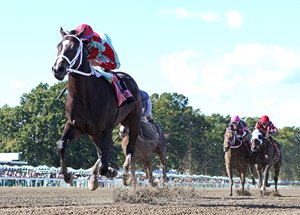N.J. Unlikely to Change Crop Rule Until HISA Starts


After a year in which New Jersey racing operated under a new and controversial state rule that prevented jockeys from using their riding crop during a race, if there's a change on the horizon it will come months from now in the summer courtesy of the Horseracing Integrity and Safety Authority.
Dennis Drazin, the CEO and chairman of Darby Development which operates Monmouth Park, says the New Jersey Racing Commission is unlikely to address its restrictions on the crop due to the July 1 launch of HISA, which will set national standards for the sport that all tracks must follow.
Under the rule the NJRC enacted earlier this year, jockeys can only use their crop as a safety measure, not to encourage the horse to run faster.
"When HISA is operational, the Kentucky rules for the use of the whip will likely be the national standard and everyone is going to be stuck with the same rule. So, since the New Jersey Racing Commission knows HISA is going to change the rules, there's no motivation to change their rules. The common sense approach for the commission is to wait for someone to set a national policy instead of changing their rules and fighting with the Jockeys' Guild over it."
The Kentucky rules center on no more than six strikes in an overhand fashion and no more than two times in succession.
Given the July 1 start date for HISA, Drazin is not expecting any changes to the rule before Monmouth Park reopens in May.
Aside from prompting perennial New Jersey riding champ Joe Bravo to move to California, the rule also elicited an online outcry against it and some bettors complained they would not wager on Monmouth races because of it.
By the time Monmouth closed Sept. 26, it handled $173,511,161 in overall wagering, averaging $3,154,748 per day for its 55-day meet. That represented a 17.1% drop from a surprisingly strong daily average of $3,807,082 during a 44-day 2020 meet when the COVID-19 pandemic reduced race dates and attendance.
In 2019, when Monmouth was open for 60 dates, the total handle was $205,545,841 for an average of $3,425,764. Those figures were 7.9% higher than the 2021 totals.
Drazin said the crop rule was not the only reason for this year's drop in wagering.
"I think everything is a factor in your handle," Drazin said. "I had just as many people complain to me that they didn't want to bet on the out-of-state signals we were taking because they weren't comfortable with the Lasix rules that prevented its use in stakes races. They wanted to see how horses handled it before they bet. Yes, there were probably people who did not wager on Monmouth because of the whip rule, but that comes with the territory."
